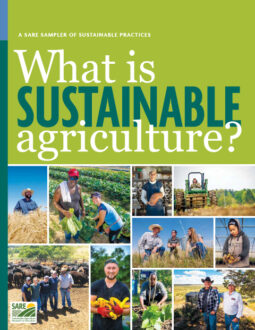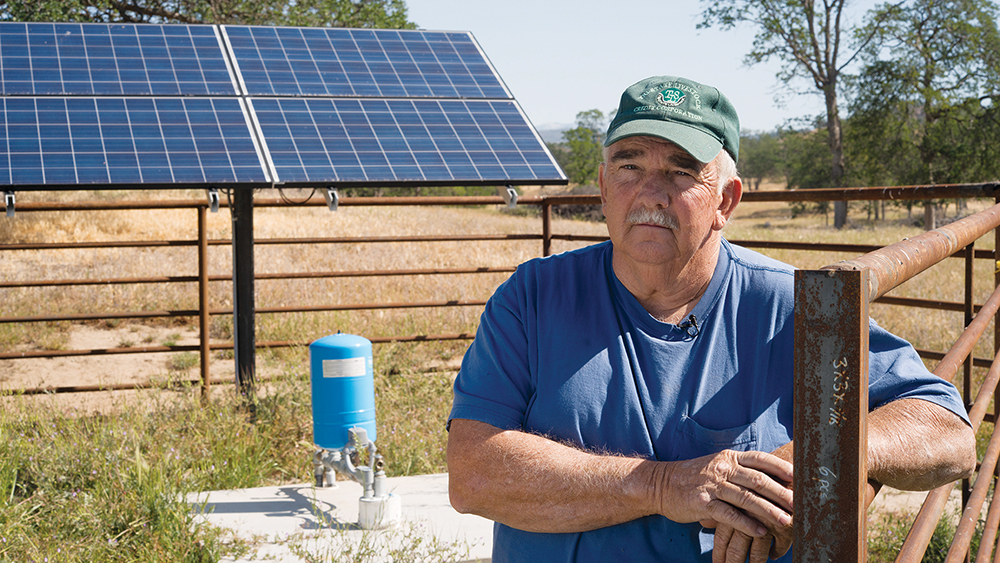
Many practices can lower a farm’s greenhouse gas emissions, including alternative manure management techniques and the use of renewable energy. Other practices that build soil organic matter, such as cover crops, compost, perennials and conservation tillage, can sequester carbon in the soil. Focusing on soil health and diversifying farm enterprises are two prime examples of how farms can adapt to extreme weather events.
Water and Climate
“Water Conservation,” the seventh episode in SARE’s “What is Sustainable Agriculture?” series shows how farmers and ranchers can manage water to increase the resilience of their operations while improving the health of their crops and livestock. This simple animation outlines basic principles of sustainable water management and is intended to complement more detailed training materials.
Sampler of Projects
Adapting to Extreme Weather Through Data-Driven Decisions
SARE project FNC19-1182
Like so many other farmers, Jeff Miller of Prairie Wind Family Farm in Grayslake, Ill., has found that increasingly extreme and unpredictable weather is making it harder to grow crops on a consistent basis and, ultimately, to run a viable business. For example, heavier and more frequent rains during the growing season cause increased weed and disease pressure on his 40-acre vegetable farm, as well as crop failure due to flooding. In an attempt to adapt to this new reality, Miller used a SARE Farmer/Rancher grant to introduce drone imagery and weather station data in order to better assess the impacts of extreme weather on his fields and crops, and to inform his responses. Miller is now using these tools to improve in-season management, such as the timing of tillage, cultivation and irrigation, as well as off-season planning, such as modifying crop rotations based on how individual fields are responding to extreme rain patterns.
Early Weaning as a Drought Management Strategy
SARE project OW18-013
More intense droughts and heat waves are occurring annually in the rangelands of California, forcing ranchers to seek out a wide range of adaptive tools if they’re going to survive. One drought management strategy that’s familiar to ranchers in other parts of the country is early weaning, but it hasn’t been studied as much in California, where calving happens in the fall instead of spring. Using a SARE Professional and Producer grant, a team of ranchers and University of California Extension specialists studied the effect of early weaning on pasture production and the performance of cows and calves. The team, led by Livestock and Natural Resources Advisor Dan Macon, looked at the economics of different weaning and feeding options, and created a decision-making tool that’s now helping ranchers evaluate which drought management strategies might work best for their situation.
Lowering Methane Emissions and Improving the Economics of Forage-Based Dairies
SARE project LNE16-352
Pasture-based dairy farmers are always on the lookout for ways to extend the grazing season and to reduce the amount of feed they need to buy. One promising approach to this for Northeastern dairy farmers is to use annual brassicas, which can also lower methane emissions, a major greenhouse gas. Supported by a SARE Research and Education grant, a multi-state research team led by USDA Agricultural Research Service Animal Scientist Kathy Soder demonstrated that canola, turnips and forage rape produce nearly double the amount of fall forage than the more commonly used annual ryegrass. These brassicas also produce two to three times the protein and energy of ryegrass, which significantly extends the grazing season and improves animal productivity. At the same time, the methane output of cows grazing on these brassicas is about 50% less than when they graze on ryegrass.
Long-Term Research on Resilient Cropping Systems
SARE projects LS18-303, LS15-267 and LS12-247
As climate patterns continue to change and extreme weather events happen with more frequency and intensity, farmers need reliable information on how to make their production systems more resilient. For Southeastern farmers, an invaluable resource is the Center for Environmental Farming Systems’ Long-Term Farming System Research trial, a multi-disciplinary project comparing the performance of five agricultural systems from many perspectives. One key finding by the group, which has been supported by three SARE Research and Education grants in the past 10 years, is about the greater resilience of some systems over others. With their research spanning more than two decades, they’re finding that cropping systems that rotate pastures with annual crops and use organic management have improved soil conditions that make them more productive and resilient in the face of climate-related threats compared to less diverse systems.
Climate Resilience Resources
Information for farmers, ranchers, educators and researchers who are seeking to conserve water and limit the effects of excess moisture.
Stories from the Field
Here are some of the ways SARE grantees are conserving and managing water.

Field Peas: A New Crop to Replace Fallow and Diversify the Farm
"As a result of this project, field peas became an established crop in southwest Nebraska, and we built a foundation for a successful and long-term pulse industry." Strahinja Stepanovic, University of Nebraska-Lincoln THE CHALLENGE In semi-arid regions, farmers without irrigation oftentimes conserve precious soil water by rotating cereal crops such as corn or wheat with […]

Profile: As the Ogallala Aquifer Dwindles, Long-Term Research Seeks a New Future
Agriculture in the Texas High Plains is a a highly productive, vital segment of the regional economy, but with some projections saying it will run out of water in just a few decades, farmers need water management solution. Some are emerging through long-term research on diversified production systems funded by SARE.

Ray Gaesser - Corning, Iowa
Ray Gaesser, a soybean producer from Corning, Iowa, who uses cover crops and no-till, is president of the American Soybean Association.
Resources and Learning
Browse all of SARE's resources on water conservation. Examples include:
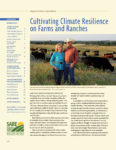
Cultivating Climate Resilience on Farms and Ranches
This bulletin outlines the new challenges that changing weather patterns pose in agriculture throughout the United States, and what you can do to make your farm more resilient.
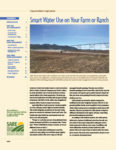
Smart Water Use on Your Farm or Ranch
As producers throughout the nation grow increasingly concerned about water scarcity, farmers, ranchers and agricultural educators are beginning to explore new, conservation-oriented approaches to water use.
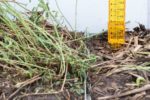
Cover Crops at Work: Increasing Infiltration
An overview of cover crop impacts on water infiltration to the soil.1 Download this fact sheet (PDF). This fact sheet is part of the Ecosystem Services from Cover Crops fact sheet series. Cover Crops and Infiltration Cover crops can successfully increase the infiltration of water into the soil layer. They do this by covering the ground with […]
